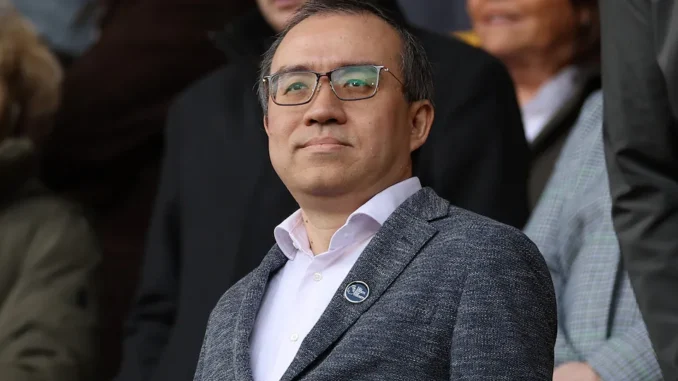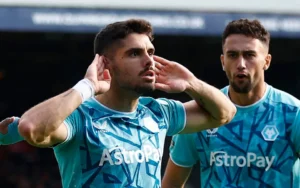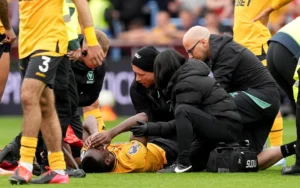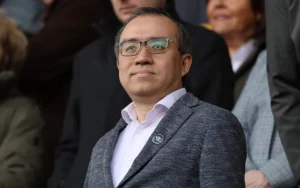
After a dismal start to the Premier League season, Telegraph Sport speaks with the club’s chairman and sports director in a special report.
The Wolverhampton Wanderers are off to their worst start to a season since 2003, yet in the background, everything is quiet and improvement is the team’s top priority. Gary O’Neil’s team faces Liverpool on Saturday in the hopes of responding to four losses from five Premier League games. The team’s training facilities has a sign in reception that reads “never give up.”
Since their promotion in 2018, Wolves, now in their seventh season in the top flight, have advanced to both the FA Cup semifinal and quarterfinals, the final eight of the Europa League, and have never finished worse than 14th in the league. Unfortunately, the past few years have been more challenging. To address some of the pressing concerns, Telegraph Sport was given a rare opportunity to meet with chairman Jeff Shi and sporting director Matt Hobbs. Supporters have been scrutinizing Wolves owners Fosun recently, and the hierarchy is quick to acknowledge that they need to communicate their strategy more aggressively.
Over the course of an hour, we discuss a wide range of subjects including the £250 million-plus sales of players, Fosun’s long-term vision, their faith in O’Neil and the dream of winning trophies.
Does the club have PSR concerns?
In the summer of last year, Wolves raised over £140 million in player sales which ultimately sparked the exit of a disillusioned Julen Lopetegui.
Ruben Neves, Matheus Nunes, Raul Jimenez and Nathan Collins were four high-profile departures as Wolves drastically moved to comply with strict Profitability and Sustainability Rules.
In the summer of this year, their best player Pedro Neto was sold to Chelsea for £54 million while captain Max Kilman teamed up again with Lopetegui at West Ham for £40 million.

Supporters were, and remain, frustrated, with some accusing Fosun of filling their pockets.
Yet Everton and Nottingham Forest were both docked points last season for PSR breaches so the threat of punishment is real. How much of a concern was PSR for Wolves?
Jeff Shi:“PSR is something that we’ve always kept an eye on and we have never been close to the line.
“We have never been panicking enough to do something to avoid breaking the rules. We’ve never had a situation where we have had one month or three weeks to agree a deal. Never.
It’s not been a massive challenge for us and, for Wolves, player trading is more about whether we let them leave or not, for sporting or financial reasons.”
Newcastle, Aston Villa and Chelsea also faced the threat of breaching PSR this summer. The three clubs had no option but to reluctantly agree the sales of some players before the June 30 deadline to avoid the prospect of sanctions.
Matt Hobbs: “If PSR is an issue for a football club, it shows you’ve got your planning wrong. We’d be disappointed in ourselves if PSR was ever an issue.
“It’s a rule you have to stick to and we run a strategy to make sure we never get anywhere crossing that line.”
Hobbs also points out that bids were rejected for other players over the summer. Marseille failed with a £21 million bid for Hwang Hee-chan, while there were also inquiries for Matheus Cunha and Joao Gomes from rival clubs.
Why was Kilman not replaced?
Kilman’s £40 million sale to West Ham in July represented a mammoth profit for Wolves, after he signed from non-league Maidenhead United for just £40,000.
He was the captain, with an outstanding appearance record, but the club opted to place their faith in 23-year-old Colombian Yerson Mosquera who had not played in the league before this season.

With Mosquera sustaining a serious injury at Villa last weekend, which will keep him out for the season, not replacing Kilman appears a risk.
MH: “Externally, some fans may feel we’ve left ourselves short. It’s actually completely married up towards what our plan was at the start of the summer.
“Playing four at the back, we’re not going to carry five centre-backs. No club of our level would.
“We had high hopes in Yerson and keeping a fifth senior centre-back happy would have been hard. With Max leaving, and Yerson coming in, we were perfectly comfortable with how that looked.
You can look at goals conceded this season and say we didn’t replace Max but we had a poor run at the end of last season [with Kilman playing every game].
“That wasn’t Max’s fault, just like it’s not Yerson’s fault this season. We also have a strategy here where we like to have a young player in there to get them ready.
“We’ve done it before with Pedro [Neto], when we had [Diogo] Jota and Adama [Traore], and when Joao [Gomes] came in to sit under Mario [Lemina], Ruben [Neves] and Joao Moutinho. That is our model and it’s why we signed Bastien [Meipiyou, from Nantes].
“Even if we’d signed another one, and we were looking, Santiago Bueno would have gone out on loan for regular football.”
Are the owners still engaged?
This is the million dollar question dominating the thoughts of many Wolves supporters.
With so many player sales over the last 12 months, Fosun have unquestionably stabilised the club’s finances.
On incomings, though, Wolves were the second lowest net spenders in the Premier League this summer, with only Manchester City spending less.
JS: “Fosun has never been an owner to spend for fun. It is not in their nature or character.
“They always try to invest where necessary, to give the club a leadership team and foundation, but also empower the team here.
The plan is to combine intelligence and teamwork, together with the cash injection, to build something for the long-term. That is always the way for the chairman, owner and group.”

Fosun insists the club is not for sale, yet there could be some developments on finance soon.
JS: “We have been speaking with groups about minority investment and there is plenty of interest.
“We have to find the right people aligned with us. The valuation, terms, and how we work together for Wolves’ long-term future is all important.
“We are in a very active process now to have more investors to join us.”
What is the long-term plan?
First of all, Wolves believe it is important to stress that the club has never been more united. All departments are collaborating together and every decision is planned. Quite simply, it is a team effort, whereas in previous years it was perhaps not the case.
JS: “I think the long-term plan is to make the club more influential, and bigger, with a larger fanbase around the world.
“To reach that goal we have to remain competitive in the Premier League and try to win something. Being competitive on the pitch is not enough, so you have to try something else.
“We are working with the city to try to make Wolverhampton more dynamic, where people can enjoy living here and being entertained here.
“In China, on social media we are perhaps in the top-four followings in the Premier League. In the UK it’s impossible because you have the ‘Big-Six’.
“That’s more because in China we have more people who know us. It is about making ourselves more influential around the world – the more people are aware of you, you have a chance to be bigger on the pitch.
It’s about being consistent on and off the pitch for ten years. I focus more on the long-term growth than a short-term win.”
After reaching the last eight of the FA Cup last year, and the semi-finals under Nuno Espirito Santo in April 2019, Shi says there is an ultimate goal.
JS: “We all want to win something. Winning the league will require a lot of luck but winning trophies or getting into Europe is imaginable.
“I don’t remember many seasons when we’ve been far away from Europe. We were always close and have also gone very far in the FA Cup. It has to be our target because that is what sport is all about.”
Read more news on
sportchannel.co.uk
Leave a Reply